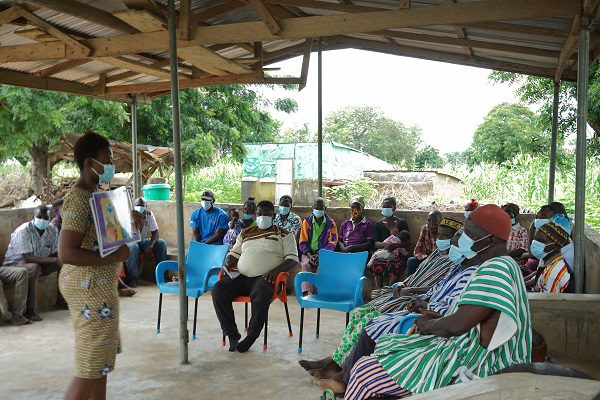Child Marriage is a human rights violation, yet remains a reality for many children, especially adolescent girls.
The right to ‘free and full’ consent to a marriage is recognized in the Universal Declaration of Human Rights, with the recognition that consent cannot be ‘free and full’ when one of the parties involved is under the age of 18 years, thus not sufficiently mature to make an informed decision about a life partner.
The Sustainable Development Goals (SDGs) identify child marriage as a harmful practice which the world should aim to eliminate by 2030.
However, in Winkongo, in the Upper East Region of Ghana, “child induced marriages emanating from teenage pregnancies and Sexual and Gender-Based Violence (SGBV) is not just happening but has become a norm,” said Essis Eric, Pastor at Calvary Church in Winkongo.
This bane was revealed during a community engagement in Winkongo, on communities’ role in promoting adolescents’ access to information and services on Sexual and Reproductive Health (SRH).
The initiative is being implemented by Savana Signatures in partnership with UNICEF Ghana, with funding support from Global Affairs Canada under the Promoting Adolescent access to SRH through Participatory Community Engagement (PASPCE) project.
Collaboration and Community Support
Pastor Eric, in addressing the chiefs, elders and community leaders, emphasized that “the development of our children is our collective responsibility. Parents should, therefore, have unashamed conversations with their children about their SRH. Teachers should help students/pupils who are confronted with SRH issues to recover and religious leaders should counsel young people on SRH issues”.
He added that parents have a role in educating their children about the biological changes that will occur in their bodies as they grow.
“It is also important to begin teaching adolescents the parts of the body, how each functions and the outcome of certain actions and inactions, particularly with regards to unsafe sexual activities; it will help young people protect themselves from teenage pregnancies, SGBV and child marriages.”
The Winkongo Chief, Chief Moses Akanzua, in addressing his subjects, religious leaders and representatives from Ghana Health Service and Savana Signatures, touted the PASPCE project as timely and in line with his longstanding dream of a protective and enabling environment for young people thrive.
According to him, championing youth development was his topmost priority during his youthful age before becoming a chief.
“However, I gave up on the fight because I thought the battle against the barriers to youth development, particularly, eliminating SGBV and Child Marriages could not be won. However, the PASPCE project has reassured me that we are capable of winning the battle if we persist, collaborate and incorporate modern strategies,” he said.
The chief charged parents to listen and support their children in order to curb child marriages or SGBV.
“No parent would be happy when their child is being called thief, a rapist, irresponsible or punished for breaking our by-laws or any other legal system, instead, we want to have our children being doctors, engineers, lawyers etc. This can only be achieved if we rally our support behind the PASPCE project in making sure its objectives are achieved.”
A community member said: “We admit we’ve wronged and neglected our children in the past when they needed us the most, but we will, henceforth, make our children our friends so they can confide in us on issues pertaining to their Sexual Reproductive Health. Together, we will safeguard our children’s future.”
Strengthening by-laws
Following a longstanding by-law dubbed ‘No Late-Night Jams’ in the Talensi District, the chief reiterated the purpose for the enactment of the said by-law and called for enforcement to curtail SGBV and teenage pregnancies, which has become the major driver of child marriages in Ghana.
“The by-law was meant to prevent young people from staying late in the night and engaging in unsafe behaviours and prevented girls from being lured or sexually abused by irresponsible persons. However, over some time now, it has not been adhered to by young people. Sequel to this, the rate of SGBV and teenage pregnancies is on the rise; this has to stop.
“I will ensure perpetrators of SGBV and Child Marriages are punished for their crimes. This will not only ensure justice but equally serve as a deterrent to other persons with similar intentions,” he warned.
He added that his old age is not a guarantee that perpetrators will go unpunished as he is willing to collaborate with Savana Signatures and its partner, UNICEF Ghana, as well as authorities to ensure justice and provide a protective and enabling environment for young people in his community.
“When we create a protective and enabling environment for our children, they thrive and become responsible in society, and contribute their quota to community development,” he concluded.
The PASPCE Project
An enabling environment is critical for the success of any programme targeting adolescent girls.
The PASPCE project seeks to sensitize duty bearers and policymakers on adolescent girls’ issues to facilitate the adoption of policies, community by-laws and referral pathways to services that will enable adolescent girls’ access SRH services.
Religious leaders such as Imams and Pastors will also be trained on adolescent girls SRH issues to enable them reach out to their congregations through the mosques and churches.
They will be challenged to use their various platforms to discuss harmful attitudes and social norms around violence against adolescent girls by integrating relevant topics into their sermons, prayer groups, and youth groups’ activities.
Source: 3news.com|Ghana


